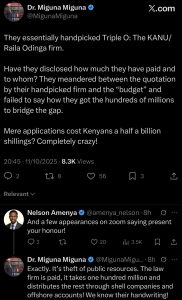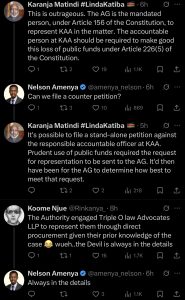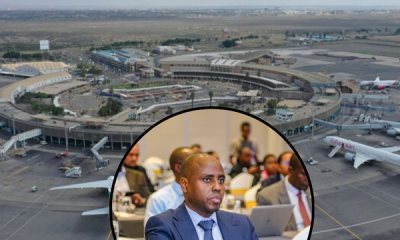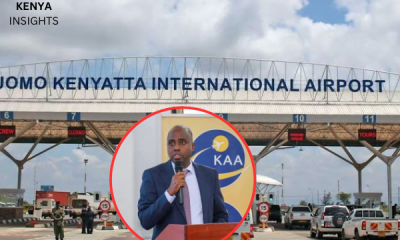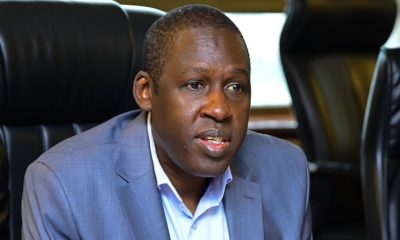News
Kenyan Fury Erupts Over Sh243m Legal Fee in Adani Airport Scandal
The inflated legal costs represent only a fraction of the Adani affair’s fiscal impact.

Official documents reveal how state authority justified bypassing competitive tender for politically connected law firm despite budget being exceeded twentyfold
Public outrage is intensifying across Kenya following revelations that the state-owned Kenya Airports Authority awarded Sh243m ($1.9m) to a newly registered law firm to defend controversial petitions against the now-cancelled Adani Group lease of Jomo Kenyatta International Airport.
The sum is nearly 20 times the original budget allocation.
The procurement process, which bypassed competitive bidding through direct tender provisions, has sparked accusations of systemic corruption and raised fundamental questions about fiscal accountability in one of East Africa’s most consequential infrastructure disputes.
Official correspondence obtained by the public shows KAA’s acting Managing Director Dr Mohamud M. Gedi formally sought approval from the Principal Secretary of the State Department for Aviation and Aerospace Development on 25 September 2025, requesting retrospective authorization for the inflated expenditure.
The Numbers Behind the Controversy
Documents obtained by whistleblower Nelson Amenya, a Kenyan graduate student who first exposed the Adani airport proposal in July 2024, reveal the Kenya Airports Authority initially budgeted Sh12.5m for legal representation.
The final contracted sum of Sh243,185,700 represents a 1,845 per cent increase from the original budget provision of Sh12.5m.
Triple OK Law Advocates LLP secured the tender through direct procurement citing “urgency” and “prior knowledge” of the case.
The tender was opened on 23 January 2025 and received a single bid from the firm.
According to KAA’s official letter to the ministry, a Tender Evaluation Committee initially recommended re-tendering due to budget constraints.
However, three factors led to a reversal of this position.
First, the committee cited “retrospective procurement,” noting that services were rendered urgently in high-profile, constitutionally sensitive matters already before the courts.
Second, officials argued the firm possessed critical institutional knowledge essential to KAA’s defence.
Third, a 10 per cent price reduction was secured during negotiations held on 2 May 2025, after which the firm successfully delivered on key assignments.
The cost structure breakdown remains opaque.
KAA officials have not disclosed hourly rates, staffing allocations, or disbursement schedules that would justify the expenditure.
This gap violates public procurement transparency standards, critics argue.
Legal and Constitutional Questions
The procurement raises substantive constitutional concerns.
Under Article 156 of Kenya’s Constitution, the Attorney General serves as the principal legal adviser to government entities and represents them in court proceedings. Legal experts question why KAA outsourced representation to a private firm when the AG’s office possesses statutory mandate and existing capacity.
“This is outrageous,” constitutional lawyer Karanja Matindi wrote on social platform X.
“The AG is the mandated person, under Article 156 of the Constitution, to represent KAA in the matter.
The accountable person at KAA should be required to make good this loss of public funds under Article 226(5) of the Constitution.”
Article 226(5) empowers parliament to enact legislation requiring accounting officers to personally compensate for financial losses resulting from willful violations of procurement procedures. However, such provisions have rarely been enforced, contributing to what transparency advocates characterize as a culture of impunity.
The selection of Triple OK Law through direct procurement was processed under Section 103(2)(b) of the Public Procurement and Asset Disposal Act, 2015, which allows for restricted tendering in specific circumstances.
KAA justified this citing the firm’s prior engagement and knowledge of the cases.
However, the provision typically applies to situations where compatibility with existing equipment or services is required, or where only one supplier exists, raising questions about its appropriate application in this instance.
The firm’s recent incorporation and alleged political connections compound perceptions of favouritism. Critics have labelled it “the KANU/Raila Odinga firm,” suggesting links to opposition political machinery.
Five Petitions, One Expensive Defence
The legal fees stem from KAA’s defence against five separate petitions and judicial review matters challenging what became Kenya’s most contentious infrastructure deal. The official letter lists the cases as:
First, Judicial Review Case No. E199/2024 filed by the Kenya Human Rights Commission and the Law Society of Kenya against KAA and four others. Second, Petition No. E366/2024 brought by Isaack Lango Guyo against KAA and two others.
Third, Petition No. E466/2024 filed by Tony Gachoka and another against Adani Group and seven others. Fourth, Petition No. E624/2024 lodged by Kenya Aviation Workers Union against KAA and four others. Fifth, Petition No. E626/2024 brought by Katiba Institute against the State Law Office and others.
The disputes largely question the constitutionality, legality, and procedural compliance of the Privately Initiated Proposal by Adani Airport Holdings Limited for the development and operation of Jomo Kenyatta International Airport.
Key issues include public participation, transparency, statutory adherence under the Public Private Partnership Act, and broader implications on national security and management of strategic public assets.
KAA’s letter notes that authority officials were “cited as a respondent in several petitions and judicial review matters arising from the proposed Privately Initiated Proposal (PIP) by Adani Airport Holdings Limited (AAHL) for the development and operation of Jomo Kenyatta International Airport.”
The Adani Saga: From Secrecy to Scandal
In June 2024, the Adani Group proposed a 30-year lease to modernize JKIA, East Africa’s busiest airport, promising $1.85bn in upgrades. The arrangement would have granted operational control to foreign private interests in exchange for revenue-sharing terms that leaked documents suggested heavily favoured the conglomerate.
Amenya’s disclosure of the proposal in July 2024 triggered immediate backlash.
Aviation workers staged strikes, senators convened emergency hearings, and civil society organizations filed court petitions arguing the deal violated constitutional requirements for public participation and transparent procurement.
Leaked contractual provisions revealed clauses requiring Kenya to compensate Adani if the company failed to achieve projected returns.
This fiscal guarantee could expose taxpayers to hundreds of millions in liabilities, critics warned. Independent feasibility studies commissioned by parliament reportedly questioned the deal’s value proposition, though officials proceeded with negotiations.
The controversy escalated in October 2024 when Kenya’s High Court halted a separate $736m Adani power transmission contract, citing opacity and inadequate stakeholder consultation.
Then in November 2024, United States federal prosecutors indicted Adani Group chairman Gautam Adani and seven executives for allegedly orchestrating a $265m bribery scheme to secure contracts in India.
President William Ruto’s administration cancelled both the airport and energy deals within days of the US indictment, but the legal challenges continued as petitioners sought declarations on the procurement processes’ legality. It was this defensive litigation that prompted KAA’s massive legal expenditure.
In his letter seeking ministerial approval, Dr Gedi acknowledged the ballooning costs.
“In view of the expanded scope and evolving nature of the ongoing matters under litigation, the Authority respectfully seeks guidance on the review and adjustment of current budgetary estimates to ensure that they adequately reflect the expanded scope of work, the protracted timelines of the litigation, and the specialized expertise required.”
The letter was accompanied by four supporting documents: the tender document submitted by the bidder, an evaluation report dated 10 February 2025, minutes of a meeting held on 2 May 2025, and a professional opinion dated 4 September 2025.
Dr Gedi requested that the approval be communicated to both the Office of the Attorney General and the Department of Justice, indicating awareness of the sensitive nature of the procurement.
Following the Money
The inflated legal costs represent only a fraction of the Adani affair’s fiscal impact.
Application fees, administrative expenses, and parliamentary inquiry costs have reportedly exceeded Sh500m, according to social media estimates cited by critics.
The cancelled deals themselves involved potential government guarantees worth billions.
Dr Miguna Miguna, a prominent political commentator, characterized the legal fee arrangement as “theft of public resources,” alleging the law firm serves as a conduit. “The law firm is paid, it takes one hundred million and distributes the rest through shell companies and offshore accounts! We know their handwriting!”
Such allegations, whilst unsubstantiated, reflect deep public cynicism about procurement integrity.
Transparency International’s 2024 Corruption Perceptions Index ranked Kenya 123rd of 180 countries, with public procurement identified as a key vulnerability.
Nelson Amenya questioned the process directly.
“Have they disclosed how much they have paid and to whom? They meandered between the quotation by their handpicked firm and the ‘budget’ and failed to say how they got the hundreds of millions to bridge the gap. Mere applications cost Kenyans a half a billion shillings? Completely crazy!”
Amenya has called for citizens to file counter-petitions challenging the legal expenditure. “Can we file a counter petition?” he asked on X, suggesting litigation to compel personal accountability from KAA officials under constitutional provisions.
Accountability Vacuum
The controversy exposes systemic weaknesses in Kenya’s public finance management. Whilst constitutional and statutory frameworks mandate competitive procurement, transparency, and personal accountability for officials, enforcement mechanisms remain inconsistent.
The Ethics and Anti-Corruption Commission, Kenya’s primary anti-graft agency, has not publicly announced investigations into the KAA procurement. Parliamentary oversight committees, which possess subpoena powers, have yet to summon officials for testimony on the cost inflation.
This accountability vacuum perpetuates what activists describe as “budgeted corruption.” The practice involves building inflated costs into initial appropriations to obscure subsequent misallocation.
The Sh12.5m to Sh243m trajectory suggests either gross initial underestimation or deliberate budget manipulation to accommodate predetermined recipients.
The timing of KAA’s request for ministerial approval on 25 September 2025, months after services had been rendered and contracts executed, raises further questions about governance protocols. The letter’s reference to seeking “guidance on the review and adjustment of current budgetary estimates” suggests retrospective authorization for expenditure already incurred.
The Adani-KAA affair illustrates broader governance challenges confronting Kenya’s infrastructure ambitions.
The country requires substantial capital investment to maintain competitiveness, yet procurement scandals repeatedly undermine investor confidence and drain public resources.
The episode also highlights tensions between executive urgency and democratic oversight. Officials justified direct procurement citing litigation deadlines and the need for firms with institutional knowledge.
Yet critics argue proper planning would have enabled competitive bidding without compromising legal defence, and question why the Attorney General’s office could not have handled the cases.
The justification that Triple OK Law Advocates possessed “critical institutional knowledge essential to the Authority’s defence” raises additional concerns.
If the firm gained this knowledge through previous engagement, questions arise about when and how that initial relationship was established, and whether it too bypassed competitive procurement.
As legal proceedings continue, the Sh243m fee has become a focal point for public frustration with opacity in government contracting.
Whether accountability mechanisms will produce consequences for officials or merely generate further rhetoric remains uncertain.
What is certain is that Kenyan taxpayers are bearing the cost, not only in shillings spent, but in eroded trust in institutions meant to safeguard the public interest. The scandal has reignited calls for comprehensive procurement reform and stronger enforcement of existing anti-corruption statutes.
Public pressure continues to mount on social media platforms, where citizens are documenting the expenditure and demanding answers.
The Kenya Kwanza government faces growing scrutiny over its handling of major infrastructure projects and the transparency of its decision-making processes.
Kenya Insights allows guest blogging, if you want to be published on Kenya’s most authoritative and accurate blog, have an expose, news TIPS, story angles, human interest stories, drop us an email on [email protected] or via Telegram
-

 Grapevine1 day ago
Grapevine1 day agoAlleged Male Lover Claims His Life Is in Danger, Leaks Screenshots and Private Videos Linking SportPesa CEO Ronald Karauri
-

 Lifestyle4 days ago
Lifestyle4 days agoThe General’s Fall: From Barracks To Bankruptcy As Illness Ravages Karangi’s Memory And Empire
-

 Americas1 week ago
Americas1 week agoEpstein Files: Bill Clinton and George Bush Accused Of Raping A Boy In A Yacht Of ‘Ritualistic Sacrifice’
-

 Business2 weeks ago
Business2 weeks agoCooking Fuel Firm Koko Collapses After Govt Blocks Sh23bn Carbon Deal
-

 Business1 week ago
Business1 week agoABSA BANK IN CRISIS: How Internal Rot and Client Betrayals Have Exposed Kenya’s Banking Giant
-

 Investigations6 days ago
Investigations6 days agoEpstein Files: Sultan bin Sulayem Bragged on His Closeness to President Uhuru Then His Firm DP World Controversially Won Port Construction in Kenya, Tanzania
-

 Business1 week ago
Business1 week agoKRA Can Now Tax Unexplained Bank Deposits
-

 News1 week ago
News1 week agoAUDIT EXPOSES INEQUALITY IN STAREHE SCHOOLS: PARENTS BLED DRY AS FEES HIT Sh300,000 AGAINST Sh67,244 CAP

